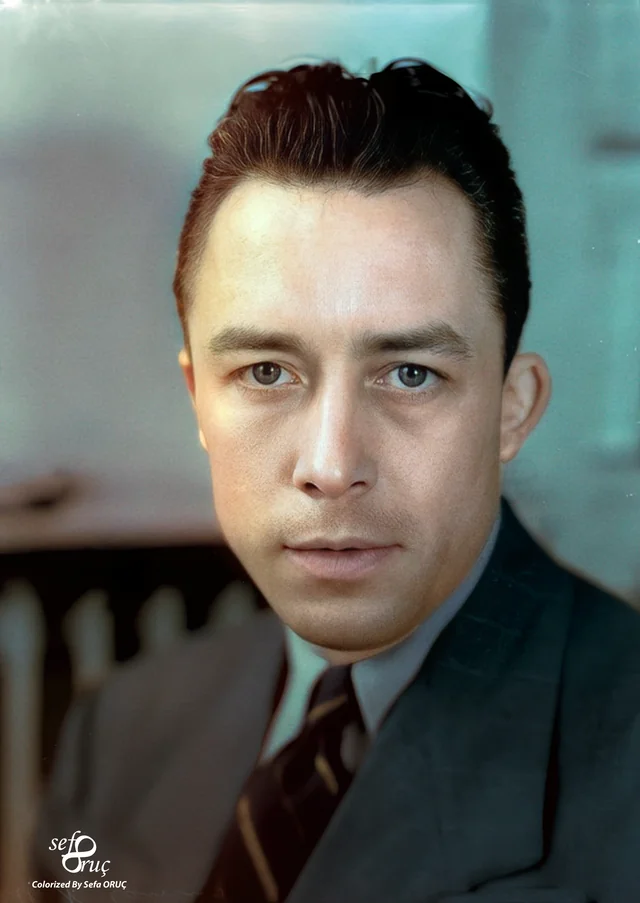The Silent Men by Albert Camus
Albert Camus’ short story The Silent Men (Les Muets), written in 1957 and published in Exile and the Kingdom, is a quiet meditation on dignity, silence, and the fragile ties between laborers and those who employ them. Set in a cooper’s shop in wartime Algeria, the story offers no grand revelations, no dramatic turns. Instead, it unfolds slowly, almost reluctantly, like a man rising each day to perform the same task he has performed for decades, shaped by time, sweat, and silence.

The Story
The story is told through the eyes of Yvars, a fifty-year-old barrel-maker. He is the kind of man Camus often turns to in his fiction: unremarkable by most standards, yet inwardly complex, deeply human. He once rode bicycles in races, a detail that quietly hints at lost youth and a life that once moved faster. Now, he rides only to reach the workshop in the morning chill. He works with his hands. He doesn’t complain. His body aches in familiar places. He shares his lunch with the same group of men. There is comfort in repetition, even if it asks much from the body.
Yvars is one of several skilled workers employed by M. Lassalle, a cooper who owns the small workshop. These men are craftsmen. They make barrels with precision, using tools worn smooth with time. Their labor is not romanticized, but it is honest, and there is a certain dignity in that. The workshop had, until recently, been a place of quiet camaraderie. The men joked. They shared stories over lunch. Their boss was not a friend, but there was mutual respect. Or at least, there was the illusion of it.
But the illusion is broken by a strike. The men, tired of stagnant wages and inflation, ask for better pay. M. Lassalle refuses. He tells them the work he gives is a form of charity, and that if they do not like the conditions, they can leave. The doors of the shop close. The strike fails. The men return to their work, but the air has changed. The laughter is gone. The shared warmth between labor and ownership has turned cold.
Camus does not dramatize this rupture. He presents it as a simple truth: something has broken, and no one will fix it. The men no longer speak to Lassalle. He, in turn, greets them each morning, but his words fall into silence. When the men file in, he waits until all are present before opening the door, a silent assertion of control. No one challenges him. But no one answers him either.
The silence becomes its own character in the story—thick, heavy, and present in every room. It is not the silence of peace, but of pride, of injury, of things that cannot be spoken because they are too deeply felt. Camus captures this beautifully: “Their mouths had been closed, they had to take it or leave it, and that anger and helplessness sometimes hurt so much that you can’t even cry out.”
Despite the coldness between them and their employer, the men remain kind and warm with each other. They continue their work with quiet competence. They share food, tools, and soft gestures. There is still a sense of community—only now, it does not include the boss. Their silence is not total. It is selective. It speaks volumes without ever raising its voice.
M. Lassalle, for his part, seems unchanged. He resumes the old rituals. He offers, without prompting, to increase salaries if business improves. He tries to restore what was lost, but the men do not respond. They have accepted the terms of their return, but they have not forgiven. Camus does not paint Lassalle as cruel. He is not a tyrant. In fact, he once gave each of his workers five bottles of fine wine every New Year. But in the moment when it counted, he chose pride over people. That choice now defines their relationship.
A Crisis Shakes the Routine
Then, one day, the routine is interrupted. An ambulance arrives at the shop. Lassalle’s young daughter is gravely ill. She must be taken to the hospital at once. The men watch in silence as the stretcher is brought in. They hear the cries of the mother, the quiet orders of the medical staff. Lassalle is pale and shaken. For a moment, the mask of the employer falls, and only the father remains.
Still, no one says a word.
No one offers comfort, not even Yvars. The men return to their work. The hammers fall in rhythm. The barrels take shape. The silence remains intact. This is not out of hatred. It is simply the silence of people who have drawn a line and will not cross it. Suffering does not erase the past. The sick child does not undo the failed strike. Lassalle’s pain is real, but it does not belong to them.
Yet something does stir in Yvars. All day, he thinks of the little girl. He sees her face. He remembers the boss’s eyes. He continues to work, but his thoughts are elsewhere. That night, he returns home and speaks to his wife. For the first time, he gives voice to what he has carried silently. He tells her everything: the ambulance, the illness, the silence of the men. His final words are simple and quiet—“Ah! It’s his own fault.”
These words are not spoken with anger. They are not triumphant. They are tired, almost sorrowful. In them, Camus reveals the full complexity of Yvars’ inner life. He feels pity. He feels loyalty to his fellow workers. He feels the weight of silence, and also its necessity. The statement is not a judgment, but a recognition of the choices that led them here. Lassalle chose distance. Now he must live with it.
Silence as Protest and Philosophy
At its core, The Silent Men is not about a strike or a sick child. It is about silence—what it hides, what it protects, and what it refuses to forget. In Camus’ world, silence is not empty. It is filled with dignity, sorrow, resistance. The men do not speak because they no longer need to. Their silence is their verdict.
The story also reflects Camus’ enduring concern with the human condition. As in The Plague or The Stranger, there is no easy resolution. Life continues. People suffer. Death is a constant possibility. The girl’s illness is a reminder that no one, not even those in power, escapes suffering. In the face of that, what remains is how we live—with pride, with silence, with compassion, or without it.
Camus does not moralize. He does not ask the reader to take sides. Instead, he shows us a fragment of life as it is: flawed, tense, quietly tragic. In doing so, he asks us to look more closely at the spaces between people—the silences, the glances, the decisions not to speak. That is where the real drama lies.
In The Silent Men, Albert Camus achieves something rare. He takes the most ordinary setting—a workshop—and fills it with the weight of human experience. Through Yvars and his fellow workers, we see how silence can be more than a lack of speech. It can be a form of dignity. A quiet protest. A shield against the indignity of being treated as less.
And in the end, we are left with a silence that speaks volumes.
If The Silent Man pulled you in with its quiet tension and depth, you might really connect with The Stranger by Albert Camus.
Albert Camus, was awarded the Nobel Prize in Literature in 1957. He received the prize for his important literary production, which with clear-sighted earnestness illuminates the problems of the human conscience in our time. The prize was awarded to Camus for his exceptional work, including novels like The Plague, essays like The Myth of Sisyphus, and short stories such as those in Exile and the Kingdom.



I do like the manner in which you have framed this specific problem and it does indeed present me some fodder for thought. However, from just what I have personally seen, I simply just hope as the comments pile on that people today remain on point and don’t embark upon a soap box involving some other news of the day. All the same, thank you for this outstanding point and though I can not really go along with it in totality, I value the viewpoint.
I couldn’t resist commenting
Some really quality content on this internet site, saved to fav.
Youre so cool! I dont suppose Ive learn something like this before. So good to find someone with some original thoughts on this subject. realy thank you for beginning this up. this website is something that is needed on the web, somebody with a little originality. helpful job for bringing something new to the web!